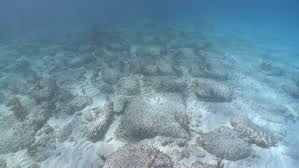
 The legend of Atlantis, a once-great civilization that sank into the ocean, has captivated humanity’s imagination for over 2,000 years. The earliest mention of Atlantis came from Plato’s Timaeus in 360 B.C., and the idea has spawned countless campfire stories, books, movies, and even one of my favorite TV shows. Plato’s original description mentions an island nation with a mighty military, and claims that the whole island sank after a failed invasion of Athens. Later interpretations of the story have elaborated, giving ancient Atlanteans technology that puts what we have today to shame. Some legends claim that a few Atlanteans escaped the sinking of their city, dispersed around the world, and founded our world’s known ancient civilizations. This fantastical story has wide-ranging implications for human history… but is any of it true?
The legend of Atlantis, a once-great civilization that sank into the ocean, has captivated humanity’s imagination for over 2,000 years. The earliest mention of Atlantis came from Plato’s Timaeus in 360 B.C., and the idea has spawned countless campfire stories, books, movies, and even one of my favorite TV shows. Plato’s original description mentions an island nation with a mighty military, and claims that the whole island sank after a failed invasion of Athens. Later interpretations of the story have elaborated, giving ancient Atlanteans technology that puts what we have today to shame. Some legends claim that a few Atlanteans escaped the sinking of their city, dispersed around the world, and founded our world’s known ancient civilizations. This fantastical story has wide-ranging implications for human history… but is any of it true?
Even in ancient times, there was much debate over whether Plato was describing true events, embellishing a story, or simply making things up. This debate has continued into the modern era, attracting the attention of people as diverse as Francis Bacon and Heinrich Himmler (who tied the story of Atlantis into Nazi Master Race propaganda).
According to Plato, Atlantis sunk approximately 9,000 years before his time, and that the story had been passed down through the generations by priests. No written evidence of the lost city has been found prior to Plato’s writings, however.

Among people who believe that Atlantis is real, there are numerous theories as to where it was. Plato mentions “the Western Sea”, which many interpret as being the Atlantic Ocean. Proposed locations include the Mediterranean sea, off the coast of Africa, off the coast of Spain, the Caribbean sea, near California, even under Antarctica. If you assume that the similar legend of Mu refers to the same lost city, you can add the South Pacific to that list.
Many have claimed to have found evidence of a city under the sea. The Bimini Road, an undersea rock formation that resembles a paved road, is considered by some followers of the Atlantis legend to be indisputable proof of a great civilization that sunk beneath the waves. Others note that the technologically advanced Minoans lived on the Greek island of Santorini until a volcano destroyed their civilization (which is kind of what Plato describes, but not exactly). Some suggest that a tsunami hitting a coastal city could account for the sinking part of the legend. Recently, people who don’t understand how sonar mapping works believed that Google Earth showed evidence. Serious archaeologists remain skeptical of all these claims.

To date, there is absolutely no proof that Atlantis ever existed. It is entirely possible that Plato loosely based his story on real events, and that an ancient civilization was destroyed by a natural disaster, but it is more likely that it was a fictional tale. Modern elaborations of the story, with amazingly technologically advanced Atlanteans founding modern human culture, have no evidence of any kind supporting them.
The legend of Atlantis isn’t as clear cut as other pseudoscience we’ve mentioned this week, since it is very difficult to prove that something didn’t exist. However, we have no proof that it did, and when we’re talking about rewriting all of human history, it seems reasonable to put the burden of proof on the Atlantis believers.
~WhySharksMatter
Ya know, if the people touting the Mahabhrata as proof are to be believed, Atlantis fought in a nuclear war against India in 6,500 BCE. On the Moon. In space ships powered by thought.
http://www.zenzibar.com/news/article.asp?id=1768
http://www.sacred-texts.com/ufo/ourpast.htm
There are others, some of them even on less creepy webpages!